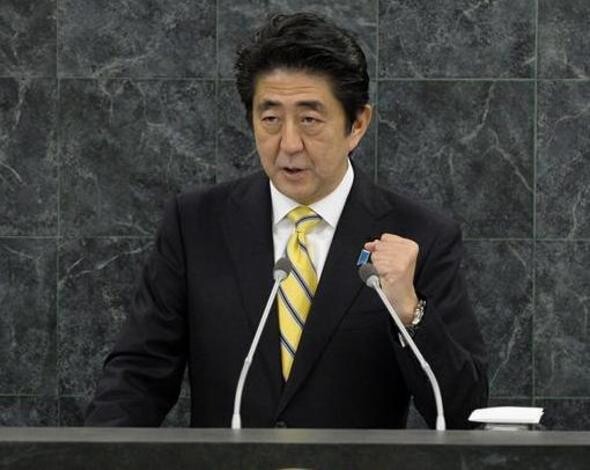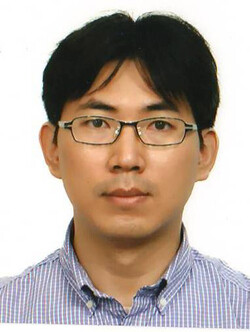hankyoreh
Links to other country sites 다른 나라 사이트 링크
[Correspondent’s column] The ambiguity of life in Japan today

By Gil Yun-hyung, Tokyo correspondent
“Just what is that supposed to mean. . . ?”
During the year or so that I have been writing articles about the administration of Japanese Prime Minister Shinzo Abe since being assigned to Japan as the Hankyoreh’s Tokyo correspondent in Sept. 2013, I have from time to time gotten discouraged, overcome by dismay. I’m talking about the huge gap between the words used by Abe and the actual policies that he is pursuing.
For example, experience teaches us the simple truth that eating makes you full. But suppose a public figure says with a straight face that people eat to be hungry - how am I supposed to report that? Should I quote this figure’s words verbatim, or should I say that he or she is lying?
Here’s an example of what I’m talking about. After the historical cabinet decision on July 1 that enabled Japan to exercise the right to collective self-defense, Abe held a press conference. During the conference, he said, “This measure will further decrease the danger of Japan being embroiled in a war. Japan will never again become a country that wages war.”
But the right to collective self-defense makes it possible for Japan to get involved in an armed conflict overseas even if its own territory is not attacked. Japan is clearly once again becoming a country that goes to war, and the risk of it being dragged into a war are greater than before.
But that’s not all. On June 20, the Japanese government announced the results of its investigation of the Kono Statement, in which it had acknowledged the forcible nature of the recruitment of the comfort women and the involvement of the Japanese imperial army in that recruitment. Even while the Japanese government was reviewing the statement, it said that it was not going to revise the statement. But when the South Korean government pointed out that Japan didn’t need to review the statement if it wasn’t going to revise it, Japan disregarded this and continued its review.
On July 14, Abe said that he wanted to have a summit with China in November, but he declined to comment about the possibility of paying respects at the Yasukuni Shrine, the issue that China really cares about. If Abe wants to have a summit with China, he should clearly state that he will not visit the shrine again. (Yasukuni, located in Tokyo, enshrines class-a war criminals that committed atrocities, and Japanese politicians’ visits there are therefore objected to by China, South Korea and other countries victimized by the Japanese imperial army.)
The end result is that we have no way of knowing whether the Japanese government really accepts the Kono Statement, or whether Abe actually wants to hold a summit with Chinese President Xi Jinping.
Such behavior by Japan creates no small degree of dismay and confusion in South Korea, China, and other neighboring countries, and it also has a decisively negative effect on building trust in East Asia - and there is already enough distrust in the region as it is.
Distinguished Japanese novelist Kenzaburo Oe explained this aspect of life in Japan using the concept of ambiguity. Oe links this to the Latin etymology of the word, which means a single word with two conflicting meanings.
This perspective is reflected in “Japan, the Ambiguous, and Myself,” the speech that Oe delivered when he accepted the Nobel Prize in literature in 1994. In the speech, Oe recalls how Japan got a fresh start after World War II as a democracy, swearing never to wage war again, and trenchantly observes that Japan has forgotten the original point of its peace constitution and is gradually moving in a strange direction.

But during the 20 years that have passed since Oe’s speech, Japan’s ambiguity has become more blatant. The Abe administration is maximizing ambiguity today, aggressively trying to go to war in the name of pacifism, reviewing the Kono Statement while claiming to accept it, and refusing to disavow visits to the Yasukuni Shrine while asking China to hold a summit.
What changes will “ambiguous Japan” bring to East Asia in the future? While it is not easy to say for sure, what is clear is that South Korea has to sit down at the table with a country whose public statements cannot be taken at face value. This may well be the least recognized of all the major challenges that South Korean diplomats face today.
Please direct questions or comments to [english@hani.co.kr]

Editorial・opinion
![[Column] Tariffs on China: Trump was dumb, Biden dumber [Column] Tariffs on China: Trump was dumb, Biden dumber](https://flexible.img.hani.co.kr/flexible/normal/500/300/imgdb/original/2024/0520/191716191153918.jpg) [Column] Tariffs on China: Trump was dumb, Biden dumber
[Column] Tariffs on China: Trump was dumb, Biden dumber![[Column] What if Seoul took reunification by force off the table? [Column] What if Seoul took reunification by force off the table?](https://flexible.img.hani.co.kr/flexible/normal/500/300/imgdb/original/2024/0520/3017161928630494.jpg) [Column] What if Seoul took reunification by force off the table?
[Column] What if Seoul took reunification by force off the table?- [Editorial] Intensifying US-China rivalry means Seoul must address uncertainty with Beijing sooner than later
- [Column] When ‘fairness’ means hate and violence
- [Editorial] Yoon must stop abusing authority to shield himself from investigation
- [Column] US troop withdrawal from Korea could be the Acheson Line all over
- [Column] How to win back readers who’ve turned to YouTube for news
- [Column] Welcome to the president’s pity party
- [Editorial] Korea must respond firmly to Japan’s attempt to usurp Line
- [Editorial] Transfers of prosecutors investigating Korea’s first lady send chilling message
Most viewed articles
- 1Xi, Putin ‘oppose acts of military intimidation’ against N. Korea by US in joint statement
- 2Kim Jong-un wanted to meet with residents of shelled Yeonpyeong Island in South, Moon recalls in mem
- 3To weigh costs and benefits, Korea must stop treating US troop presence as a sacred cow
- 4[Column] What if Seoul took reunification by force off the table?
- 5Berlin mayor hints at tearing down ‘comfort women’ memorial in city
- 6[Column] Tariffs on China: Trump was dumb, Biden dumber
- 7[Exclusive] Truth commission to seek additional murder charges for figures behind 1980 Gwangju massa
- 8For new generation of Chinese artists, discontent is disobedience
- 9Naver’s union calls for action from government over possible Japanese buyout of Line
- 10[Editorial] Transfers of prosecutors investigating Korea’s first lady send chilling message